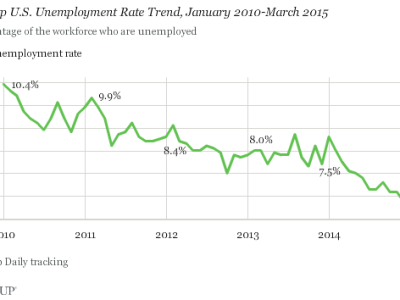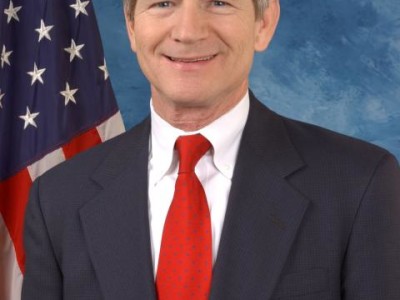Regulatory Policy
Legacy Goods and Environment Preservation
The value of some goods like wilderness today depends on their futures.
Normally, economists imagine, equal experiences become less valuable as they recede further into the future. But some types of goods don’t have that kind of relationship with future experiences. They can become more valuable as they extend farther into to the future. Take this blog post, for example. I’m really happy that you’re reading it …
Continue reading “Legacy Goods and Environment Preservation”
CONTINUE READINGThe Perverse Growth of the “Job Killing” Meme
As unemployment goes down and down, talk about “job killing regulations” goes up and up.
We’ve had a number of posts about the claim that regulations cause major job losses. The evidence doesn’t support this claim. (See this post from October). But the claim at least seemed understandable in the depths of the recession, when people were desperately worried about unemployment. The weird thing is that as unemployment has gone …
Continue reading “The Perverse Growth of the “Job Killing” Meme”
CONTINUE READINGTraitors, Militias, Welfare Moochers, or Lobbyists?
Those Who Took Over the Oregon Wildlife Refuge are Robbing the Rest of Us
The Internets are filled with excellent (and some not-so-excellent) commentary on the right-wing militia takeover of a building in Oregon’s Malheur National Wildlife Refuge: I recommend this piece from the great Charles Pierce on the meta-political aspects. But the standoff is suffused with legal issues, and for Legal Planet readers, particularly environmental legal issues. At FiveThirtyEight, …
Continue reading “Traitors, Militias, Welfare Moochers, or Lobbyists?”
CONTINUE READINGKey Environmental Developments Ahead in 2016
Here are seven of the most important developments affecting the environment.
2015 was a big year for agency regulations and international negotiations. In 2016, the main focal points will be the political process and the courts. Here are seven major things to watch for. The Presidential Election. The election will have huge consequences for the environment. A Republican President is almost sure to try to roll back most …
Continue reading “Key Environmental Developments Ahead in 2016”
CONTINUE READINGNewsflash: Senate Passes TSCA Reform
A New Chapter In the Effort To Reform Federal Chemical Regulation For the First Time in 40 Years
In a striking turn of events, last night the Senate passed a newly revised version of the Frank R. Lautenberg Chemical Safety for the 21st Century Act, which would reform the Toxic Substances Control Act (TSCA) for the first time in four decades. A summary of the bill’s provisions and analysis of the differences between …
Continue reading “Newsflash: Senate Passes TSCA Reform”
CONTINUE READINGCalifornia Supreme Court Hands Air District, Environmentalists Qualified Win
Justices’ Unanimous Opinion Addresses Key “Scope of CEQA” Issue
In a closely-watched case, the California Supreme Court today issued a unanimous decision on the scope of the California Environmental Quality Act (CEQA), California’s most important and heavily-litigated environmental statute. That decision is unlikely to fully satisfy either side in the litigation, though over the long-term it would seem to favor local regulators and their …
Continue reading “California Supreme Court Hands Air District, Environmentalists Qualified Win”
CONTINUE READINGDoes the Paris Agreement Open the Door to Geoengineering?
If we’re serious keeping warming “well below 2°C, geoengineering may be necessary.
The Paris establishes an aspiration goal of holding climate change to 1.5°C, with a firmer goal of holding the global temperature decrease “well below” 2°C. As a practical matter, the 1.5°C goal almost certainly would require geoengineering, such as injecting aerosols into the stratosphere or solar mirrors. Even getting well below 2°C is likely to …
Continue reading “Does the Paris Agreement Open the Door to Geoengineering?”
CONTINUE READINGGuest Blogger Kate Konschnik: The Debate about EPA’s Authority to Regulate Carbon Pollution is a Lot of Things – But Not These Things
Kate Konschnik is the Director of Harvard Law School’s Environmental Policy Initiative. The views expressed in this blog post are her own.
Clean Power Plan challengers have asked the D.C. Circuit to stay the rule pending litigation. Today, industry and environmental groups supporting EPA will file their oppositions to this request. The stay motions included the charge that EPA may not use Section 111(d) at all to curb pollution from existing power plants. Dan Farber and I …
CONTINUE READING“Necessary and Appropriate”
EPA has now formally proposed its response to the Supreme Court’s opinion in Michigan v. EPA
Although the Paris talks are justifiably getting the lion’s share of the attention, there have been other significant environmental actions recently. One of those involves the EPA’s effort to reduce toxic emissions from power plants (particularly coal-fired plants). The Clean Air Act gives special treatment to toxic emissions from power plants. Other sources are regulated …
Continue reading ““Necessary and Appropriate””
CONTINUE READINGMr. Smith’s War Against Science
Further harassment of climate scientists from the House Science Committee.
Lamar Smith (R-Tex.), who chairs the House Committee on Science, Space and Technology, doesn’t believe in climate change. Still, by current political standards, I guess we should be glad that he hasn’t accused them of cheering when the Twin Towers fell, as his party’s leading contender for the Presidency did to what he called “thousands …
Continue reading “Mr. Smith’s War Against Science”
CONTINUE READING












